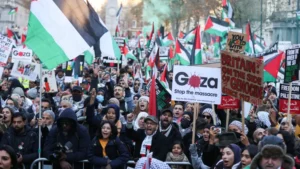War on Gaza: Have UK protests made a difference?

Demonstrators hold Palestinian flags and signs in Whitehall by the Cenotaph, London, during a protest in solidarity with Palestinians in Gaza, during a temporary truce in the Israel-Gaza war, 25 November 2023
Ismail Patel writes in The Palestine Chronicle on 16 November 2024:
Over the past year, a remarkable surge of solidarity for Palestine has swept across Britain, with millions of people flooding the streets in scores of protests. This collective outcry against Israeli atrocities has drawn attention worldwide, but a critical question lingers: has it made a difference?
At first glance, the ongoing Israeli assault on Gaza, now in its second year, suggests otherwise.
From this perspective, one might be tempted to dismiss the protests as futile background noise. Yet, such a conclusion fails to account for their role in undermining the very levers that enable genocide, including political will, media representation, public opinion and economic systems.
At their core, protests offer a profound and unequivocal message: “not in our name”. Regardless of whether they halt violence, they register citizens’ refusal to be complicit with their governments in the horrendous atrocities being committed in Gaza.
These protests have achieved more than mere moral declarations, bringing about tangible shifts in convincing ways.
One of the most powerful aspects of the protest movement has been the sheer diversity of those taking part. Protests in Britain and around the world have drawn people of all ages, ethnicities, colours and faiths, who have united to seek justice and freedom for the Palestinian people. In this way, the protests offer a stark contrast to the forces of xenophobia, racism and racial supremacy that underpin the Israeli apartheid regime and its supporters.
Shifting public opinion
Perhaps one of the most measurable impacts of these protests has been the shift in public opinion. In May 2023, around 23 percent of British people sympathised with the Palestinians.
A more recent UK poll in May 2024 showed that more than half of respondents supported ending arms sales to Israel, more than two-thirds supported an immediate ceasefire in Gaza, and sympathy for Palestinians has increased to thirty-one percent.
Protesters have also empowered diplomats and governments, particularly from the Global South, to resist pressure from the US. At the United Nations, nearly all nations defied the US by voting for a ceasefire and humanitarian aid to Gaza. Diplomats from dozens of countries walked out when Israeli Prime Minister Benjamin Netanyahu took the podium, sending a powerful message of defiance.
Amid the ongoing public protests, other important developments have taken place. South Africa filed a case at the International Court of Justice accusing Israel of committing genocide, while the prosecutor of the International Criminal Court filed an application for arrest warrants for Netanyahu and his former defence minister, Yoav Gallant, along with several Hamas leaders.
An increasing number of countries have opted to recall diplomats or cut ties with Israel, including Chile, Colombia, Chad and Turkey, among others. Arms sales to Israel have also been halted or restricted in some countries, such as Canada, Italy, Spain and Belgium.
On Britain’s domestic political landscape, protests have had a notable impact. In the summer election, several independent candidates ran on the issue of Gaza and defeated veteran politicians, as Prime Minister Keir Starmer’s position on Israel has increasingly alienated the nation.
Above all, protests have given the occupied, besieged and bombed Palestinian people something far more important: hope. A recent YouGov poll found that 44 percent of Labour voters sympathised more with Palestinians than with Israelis, while only 10 percent were more sympathetic to Israelis. Thus, when Starmer asserts that the UK “stands with Israel”, he stands increasingly alone – out of touch with the nation and with Labour Party supporters.
The ongoing protests have also pushed western-centric newsrooms and social media platforms, criticised for their biased coverage, to confront the realities on the ground, rather than simply burying all the horrific atrocities being committed by Israeli forces against Palestinians.
